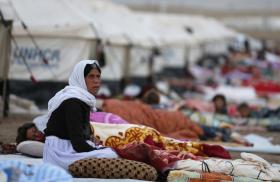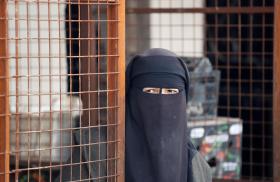Part of a series: Counterterrorism Lecture Series
or see Part 1: U.S. Efforts against Terrorism Financing: A View from the Private Sector
A top Justice Department official shares a briefing on his agency's efforts to counter Iran's global illicit activity.
On March 23, 2010, Steven Pelak, the U.S. Justice Department's first national coordinator for export enforcement, addressed a special Policy Forum luncheon at The Washington Institute. Also serving as deputy chief of the department's Counterespionage Section, he supervises investigations and prosecutions of export-control and embargo violations. During the Policy Forum, Mr. Pelak discussed Justice Department efforts to enforce U.S. sanctions against Iran and disrupt that country's illicit procurement networks around the world. The following is a rapporteur's summary of his remarks.
In recent weeks, calls for additional sanctions against Iran and increased prosecutions of violators have highlighted the need for effective enforcement mechanisms. Although enhanced sanctions may be valuable, they will have little effect if there is no penalty for violations. As part of its effort to reinforce sanctions regulations and ensure that U.S. national security interests are preserved, the Justice Department has sought to disable Iranian procurement networks that may involve U.S. companies, citizens, or goods.
The Threat
The threat of Iran's procurement networks is clear: for example, a foreign agent can acquire weapons parts from a U.S. company, illegally transport them overseas through a third country to Iran, and pass them onto an operative in Iraq, who can then use them to create an improvised explosive device (IED) that kills American soldiers. The Justice Department has the authority to prosecute participants in such networks when American entities or goods are involved, despite the fact that large portions of these networks are located outside the United States. In many cases, prosecutors target individuals who cause an American company to be involved (sometimes unwittingly) in an illicit transaction. Some have accused the United States of acting extraterritorially in these types of cases, but this criticism is without merit -- there is a U.S. angle in each of these prosecutions because they all involve American citizens, goods, or both.
Many individuals involved in procurement networks are motivated not by a specific political allegiance or ideology, but by money. For example, Asher Karni, an Israeli national working in South Africa, procured hundreds of triggered spark gaps for Pakistan. These high-energy power switches are dual-use goods, playing an integral role in both medical devices and nuclear weapons. Even as he worked for the Pakistanis, however, Karni also helped India obtain weapons testing equipment. He later pled guilty to these charges after being arrested during a skiing vacation in the United States.
In another case, Amir Hossein Ardebili conspired to procure radar and fighter aircraft components for Iran in clear violation of U.S. export control laws. He pled guilty after being extradited to the United States from Georgia, where he was caught in an undercover operation. It has since become clear that he was motivated more by greed than by any ideological allegiances.
Export Control Initiative
The Justice Department's Export Control Initiative has helped increase the government's focus on enforcement. Under this measure, the department works closely with a number of agencies in targeting illicit procurement networks, such as the FBI, the Bureau of Industry and Security, Immigration and Customs Enforcement, the Defense and Naval Criminal Investigative Services, and the Air Force Office of Special Investigations.
The initiative also includes an education and training program for prosecutors and investigators throughout the country. More than a thousand federal officers have already received such training, along with numerous federal prosecutors and analysts. In addition, the department provides advice and counsel to other agencies, departments, and local law enforcement offices that request it. Overall, the initiative has improved coordination among such agencies as well as cooperation with the intelligence community.
Regarding prosecutions, the initiative has paid major dividends, resulting in an approximate 30 percent increase in the number of defendants charged. The variety of cases has also widened, though prosecutions involving Iran and China remain the top priority. Other countries have improved their export control laws as well. For example, the United Arab Emirates enacted new legislation on this front in 2007, and the United States continues to work with authorities there to ensure effective implementation. Similarly, Malaysia may enact such legislation in the near future. The number of export-control-related international task forces has also increased -- a sign that other countries are taking the issue seriously.
Disrupting and Prosecuting Iranian Procurement
A number of different agencies are involved in enforcing sanctions against Iran, each playing a different role. While the Justice Department takes the lead on prosecutions, for example, the Treasury Department handles licensing decisions. The intelligence community plays a critical part as well, of course. Disrupting procurement activity requires coordination with intelligence agencies in order to identify the individuals and broader networks involved. Intelligence can also help law enforcement agencies interdict illegal exports before they leave the United States, lure targets to locations for arrest, and subsequently exploit their communications.
Foreign law enforcement and intelligence agencies can help U.S. authorities identify and disrupt illicit procurement networks as well. For example, they helped uncover illegal exports by Aviation Services International (ASI), a small Dutch company that ordered goods from multiple American companies, shipped them through third countries, and ultimately transported them to Iran for military purposes. Foreign law enforcement provided the U.S. government with evidence that ASI, under the direction of Robert Kraaipoel, had shipped military aircraft parts and unmanned aerial vehicle components to Iran for more than ten years. Foreign officers subsequently detained shipments and requested statements of proof regarding their destination. ASI provided false documentation and was ultimately indicted (originally under seal) in 2007.
When the charge was unsealed, no bank would hold Kraaipoel's money other than Iran's Bank Melli (now designated by the United States for its role in Tehran's weapons of mass destruction activities). In addition, the U.S. Commerce Department added him to its "denied party" list, which barred him from obtaining any goods with U.S. components. Within forty-eight hours of being placed on that list, Kraaipoel began the initial steps leading to his cooperation and eventual plea of guilty to conspiracy under the U.S. International Emergency Economic Powers Act. Even more important, he provided information leading to numerous other investigations and enabling U.S. authorities to more effectively target the broader network.
Conclusion
For the foreseeable future, export control enforcement will continue to focus on Iran and China, devoting extra attention to banks and other components of procurement networks such as freight forwarders. Interagency cooperation and a strong system of relevant U.S. law are the two most valuable resources at the Justice Department's disposal. Sharing information and resources with agencies to create reciprocal relationships allows for more successful prosecutions of violators. And the department's efforts in this arena ensure that sanctions against Iran and other countries are enforced and ultimately support U.S. national security efforts.
Ironically, America's strong rule of law actually encourages Iranian procurement networks to seek out U.S. goods despite the risk of detection. That is, American goods tend to be higher quality because manufacturers know that they will be held accountable for defects and other problems. For example, Iranian operatives know that if they purchase an electronic component for an IED from the United States, it will be more likely to work. By identifying and disrupting such procurement efforts, the Justice Department is helping the United States and its war-fighters gain an important edge on the battlefield and beyond.
This rapporteur's summary was prepared by Stephanie Papa.





